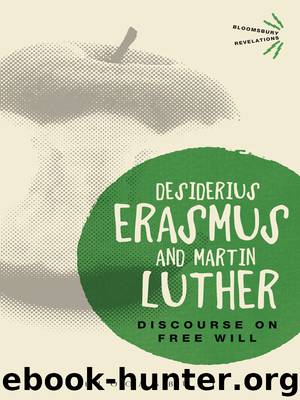Discourse on Free Will by Luther Martin Erasmus Desiderius

Author:Luther, Martin, Erasmus, Desiderius
Language: eng
Format: epub
Publisher: Bloomsbury Publishing
Published: 2013-12-24T16:00:00+00:00
Chapter 6
Luther’s Proofs against the Free Will
We want to examine1 now how valid are Martin Luther’s [arguments] with which he wishes to topple the freedom of the will from its throne.
42) Weakness of human nature
He quotes a passage from Genesis: “My spirit shall not remain in man forever, since he is flesh” (Genesis 6,3). Scripture understands by “flesh” here not simply a godless passion, as Paul sometimes uses it when commanding the mortification of the flesh,2 but rather the weakness of our nature inclined towards sin, as Paul again implies when he calls the Corinthians carnal, as little children in Christ, with no capacity yet for solid doctrines.3
Moreover Jerome remarks in his Hebraic Questions4 that the Hebrew differs from our Latin text, namely, “my spirit will not judge these men in eternity, because they are [merely] flesh.” These words betray God’s gentleness rather than severity. “Flesh” refers to man, by nature weak and inclined to evil. In turn God’s wrath is called “spirit.” Accordingly, God affirms he does not want to retain man for eternal punishment, but rather out of mercy [he wants] to punish him already here [on earth]. This utterance refers not to all mankind, but only to the men of those days, terribly corrupted by abominable vices. It states explicitly “these men.” God did not just refer to all men of those days, because Noah, for example, was praised as a just man agreeable to God.
Download
This site does not store any files on its server. We only index and link to content provided by other sites. Please contact the content providers to delete copyright contents if any and email us, we'll remove relevant links or contents immediately.
The Lost Art of Listening by Michael P. Nichols(7476)
Why I Am Not A Calvinist by Dr. Peter S. Ruckman(4133)
The Rosicrucians by Christopher McIntosh(3503)
Wicca: a guide for the solitary practitioner by Scott Cunningham(3157)
Signature in the Cell: DNA and the Evidence for Intelligent Design by Stephen C. Meyer(3114)
Real Sex by Lauren F. Winner(3000)
The Holy Spirit by Billy Graham(2932)
To Light a Sacred Flame by Silver RavenWolf(2801)
The End of Faith by Sam Harris(2722)
The Gnostic Gospels by Pagels Elaine(2515)
Waking Up by Sam Harris(2445)
Nine Parts of Desire by Geraldine Brooks(2355)
Jesus by Paul Johnson(2347)
Devil, The by Almond Philip C(2320)
The God delusion by Richard Dawkins(2293)
Heavens on Earth by Michael Shermer(2266)
Kundalini by Gopi Krishna(2167)
Chosen by God by R. C. Sproul(2148)
The Nature of Consciousness by Rupert Spira(2082)
